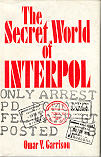
The Secret World of Interpol
by Omar V. Garrison
What, exactly, is the role of Interpol, the international police organization which has close ties with the law-enforcement systems of 122 nations, including Communist-bloc countries?
Why has Interpol concealed from the public view its true history and legal status?
For the first time, this book provides documented answers to these and other vital questions concerning the worldwide intelligence network with access to massive files on private citizens.
Among other startling facts, this thoroughly researched work reveals that:
- Interpol is an autonomous organization that is not accountable to any national government or sovereign power. A German court called it "a legal non-entity."
- Interpol's Paris headquarters provides a relay point for police of member countries to exchange information from their secret files. This means that the massive data banks of the FBI, IRS, etc., already under fire for their misuse at home, have become global lending libraries.
- No matter what laws the U.S. Congress or the British Parliament may pass to control the confidentiality of official files, such statutes are not binding on Interpol's international bureau.
- Some of Interpol's South America bureau chiefs are either currently or were formerly involved in an important drug trafficking network which employs courier routs to Brazil, Paraguay, Argentina, and the United States.
- As late as 1968, the Interpol General Assembly elected a former Nazi SS officer as the organization's president, who served until 1972.
The author warns that the growing number of computerized dossiers on individuals around the world will eventually make possible the total surveillance and therefore total control of whole populations. He writes:
"Interpol's Orwellian dream is to possess a third or forth generation computer, plugged into the far-flung, interfacing system of the U.S. and other industrialized nations, as well as the European Informatics Network (Reseau Information Europeen) currently in the development stage."
To counter this treat, Mr. Garrison suggests a number of minimal safeguards urgently needed to control the current collection, storage and re-transmission of personal files on a universal scale.
Readers who reacted to the revelations of Watergate with a feeling of uneasiness, will find the disclosures in this book thoroughly frightening.
Secret World of Interpol
